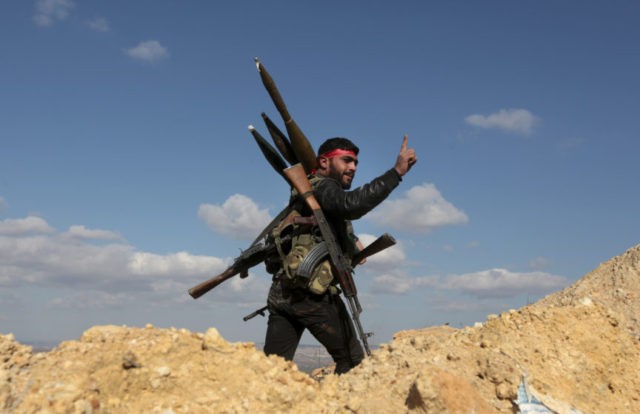The Middle Eastern outlet Kurdistan 24 interviewed Kurdish civilians in Afrin, northern Syria, who had taken to hiding in local caves from what the outlet called “heavy bombardment” of civilian areas by the Turkish military.
President Recep Tayyip Erdogan announced in mid-January that Turkey would invade Afrin to contain the alleged threat posed by the Syrian Kurdish People’s Protection Units (YPG/YPJ), a U.S.-allied military that played a significant role in defeating the Islamic State in the country. While the YPG are U.S. allies, Turkey is a fellow NATO member nation, and the Trump administration has largely abstained from playing a role in the conflict.
Kurdistan 24 published video on Monday of a family living in an ancient cave in Afrin, fleeing Turkish airstrikes. “Our ancestors lived in caves and it was normal for us,” one man told the outlet, insisting that villagers would not flee to any other country under airstrikes. The caves, they explained, were manmade, ancient caves.
“In every village in Afrin there exists such a cave,” the report notes. Those pictured in the report are far from the only ones resorting to cave dwelling, as many reports indicate that Turkish airstrikes have leveled entire villages.
A large number of these villagers are Kurds. Erdogan has argued that the Afrin region is majority Arab and, thus, requires Turkish intervention to prevent Kurdish colonization. Yet Afrin lies within what is known as “Rojava,” or Syrian Kurdistan, and has been majority Kurdish for centuries. The United Nations issued a report last week finding that at least 15,000 Afrin locals are now internally-displaced persons (IDPs) after formerly residing in the villages the Turkish government claims are populated by “terrorists.”
Among the casualties of Turkish airstrikes in Afrin have been schools, mosques, and other necessary civilian infrastructure. “There is random shelling and bombardment every day, although we are all civilians here,” one man told Kurdistan 24.
Syrian Kurdish fighters also accused the Turkish government of conducting airstrikes over vital historical landmarks, destroying statues outside of a 3,000-year-old temple.
The Turkish government insists that it is the Kurdish YPG, not the Turkish military, who are victimizing civilians. The state-run Anadolu news agency reported on Monday that the YPG “plans to use civilians as human shields,” according to unnamed “local sources.” These sources claimed that YPG fighter were “reportedly digging trenches at the main entrances and outer neighborhoods of Afrin, and building defensive walls.” Anadolu concludes from this activity that the YPG is preparing to trap civilians in the heart of Afrin city and dare the Turkish government to bomb them.
The Turkish government considers the YPG indistinguishable from the Kurdistan Workers’ Party (PKK), a Marxist, U.S.-designated terrorist organization. Both the United States and the Democratic Union Party (PYD), the YPG’s political party, deny that they are one in the same.
On Monday, Yeni Safak, a pro-Erdogan Turkish newspaper, claimed that the YPG had launched an “ethnic cleansing” campaign in the area and throughout northern Syria, including east in al-Hasakah. Erdogan has threatening to push the Turkish border south and send troops as far as the Syria/Iraq border.
The Kurds are, indeed, amassing resources in Afrin city. A report from the Kurdish outlet Rudaw argues that the buildup is purely defensive, a response to Erdogan calling the YPG a “horde of murderers” and vowing to “choke” them out of existence. Erdogan has not clarified who would prevent a reemergence of the Islamic State in Syria without a formidable YPG force.
The YPG has begun to recruit through “mass mobilization” efforts in Afrin, attracting hundreds, many teens in “mismatched military gear, some in jeans and others with scarves wrapped around their faces,” Rudaw notes. All seek to defend their families from invasion. The women join the YPG’s all-female counterpart, the YPJ.
Kurdish officials are quick to note that not all volunteers will fight—the PYD’s efforts to feed civilians and aid wounded fighters are more important than ever. “Logistical support,” officials told Rudaw, are as necessary as military support.

COMMENTS
Please let us know if you're having issues with commenting.